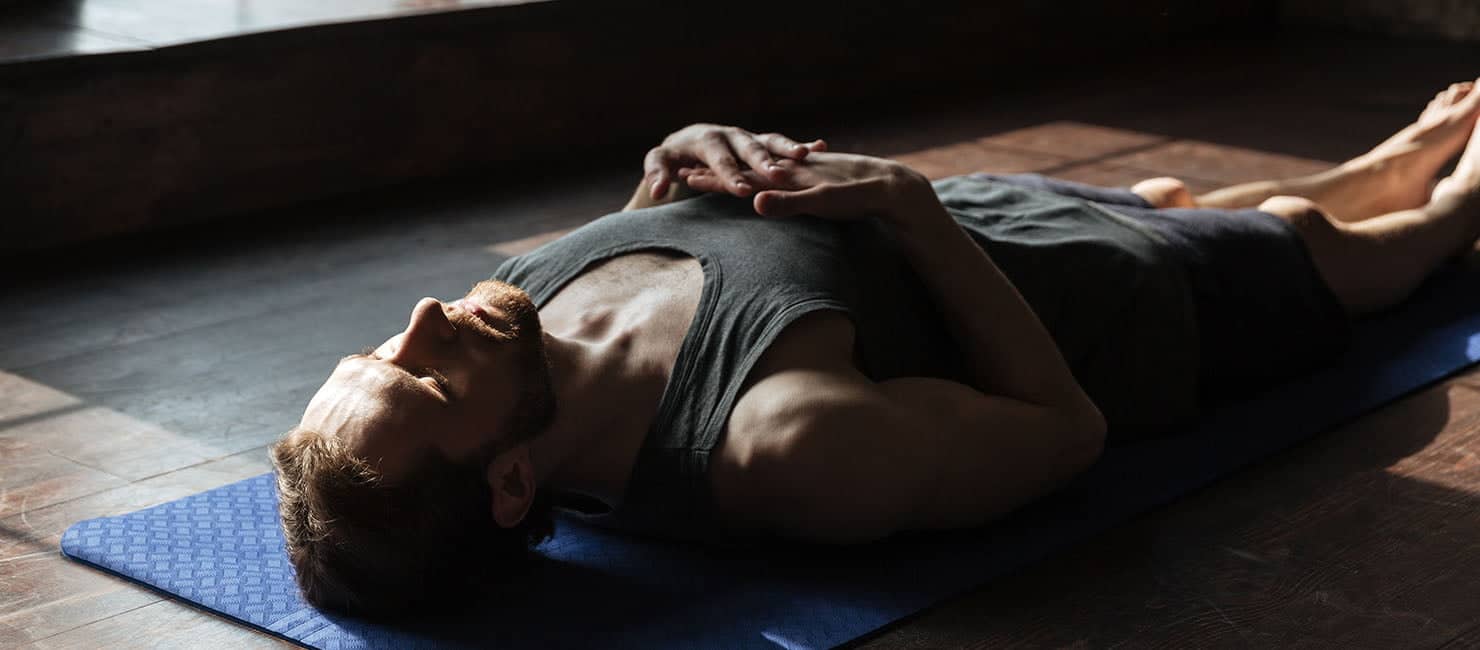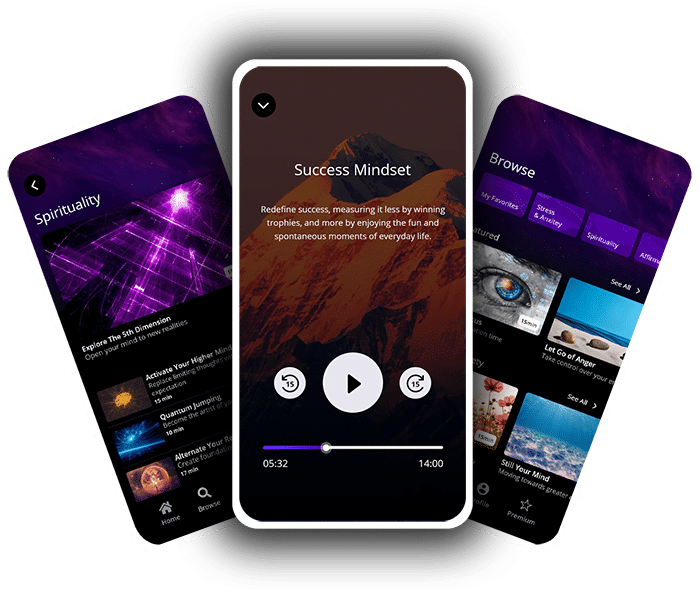Why does meditation make me sleepy? “Makes Us” in this case, because many of us who meditate regularly have experienced this. Let’s first get head-on with it and understand what happens when you are falling asleep during meditation.
You can also try short and engaging meditations like this one to avoid falling asleep.

Unleash Your True Potential!
Explore the world of meditation with our powerful guided sessions crafted to bring peace and strength to your spirit.
But first, let’s ensure our sessions are the perfect fit for you.
Take our short quiz to find out!
Table of contents
- How To Differentiate Between Fourth Consciousness And Sleepiness During Meditation?
- What are the reasons for falling asleep during meditation?
- 9 Tips To Avoid Sleepiness When Meditating
- Become aware of the energy of the food you consume.
- Chew well and eat nutritious food.
- Keep your health on the check.
- Take breaks whenever needed.
- Use guided meditation to keep you alert
- Meditate by sitting on the ground
- Be mindful of your posture during meditation.
- Keep your eyes open and focus on something.
- Pick a meditation time according to your sleep chronotype.
- Conclusion
What happens when you fall asleep during meditation?
What feels like sleeping is the state of the fourth consciousness. It’s also known as the “Turya” state. It is the highest level of brain function. This state of consciousness is the result of a deeper meditative state. When your body is highly relaxed, your mind is still alert.
It is a state between waking, dreaming, and sleeping. During this time, our minds are open to tapping into its real power. It’s incredible to be able to achieve it.
What if you are falling asleep instead of going into the fourth consciousness?
Meditating sometimes puts you in Turya or fourth consciousness. This doesn’t mean you can’t fall asleep while meditating. That can also happen if you are incredibly exhausted and didn’t get enough sleep the night before. Or if you have consumed a lot of carbs or a big meal.
How To Differentiate Between Fourth Consciousness And Sleepiness During Meditation?
The key difference between sleep and the fourth consciousness is awareness. During the fourth consciousness experience, your brain is still actively functioning and is in a state of awareness. On the other hand, when you sleep, the brain is still active but lacks complete awareness.
Look for these signs to differentiate between falling asleep and stepping into the fourth consciousness:
- Sleep paralysis but not sleep paralysis: You are aware and calm, but your body is completely rested as if you are asleep. Sleep paralysis is a scary feeling, but the state of consciousness we are talking about is not scary. You are in a meditative state, and your mind is active as well as aware.
- Posture and position of your head: When we fall into slumber, the first thing that happens is we tilt our head for support and move. It’s our body’s natural response to gravity. As we get sleepy, the relaxed state of our body and lack of awareness results in losing our head’s balance. If you get back to awareness with a jolt during meditation practice, you were definitely asleep.
- The changed pace of breath: When in the turya state, your breath will be more consistent and slow compared to the REM stage. We breathe faster and more erratically as we fall asleep.
Now let’s find out the main reasons behind sleepiness in the meditative state.
What are the reasons for falling asleep during meditation?
Many factors can contribute to sleepiness during meditation practice, such as prolonged fatigue, not getting enough rest, or eating a heavy meal right before you meditate. Identifying what is causing you to fall asleep will make it easy to eliminate those things from your schedule.
Lethargy Of The Mind And Body
Lethargy can be the result of stress, underlying medical conditions, or a side effect of medications. Sometimes you can feel lethargic due to the weather or when you are recovering from sickness. Notice how you feel during your day to see if lethargy is what is causing you to fall asleep while meditating.
Constant sleep deprivation can also lead to lethargy. If you are feeling low and tired as you go about your day, then you should try to take a break and take some extra rest.
Meditating At Night
Unless you are a night owl, it is the time when most of us are extremely tired. If you are choosing to meditate at this time to unwind, then it’s okay even if you fall asleep. If you wish to stay awake and reap more benefits from meditation than just a restful night’s sleep, check out the best time to meditate.
You can try a short guided meditation to let go of the day but know that it will eventually lead you to a relaxing sleep. You can avoid meditating right before your bedtime if you don’t want to fall asleep halfway through the meditation.

Unleash Your True Potential!
Explore the world of meditation with our powerful guided sessions crafted to bring peace and strength to your spirit.
But first, let’s ensure our sessions are the perfect fit for you.
Take our short quiz to find out!
Related: Is Meditating In Bed Dangerous? 3 Downside Of Laying Down To Meditate
Consuming Heavy Meals Right Before Meditation
This can also be a time-related thing, or you might be eating too many carbs that are making you sleepy. A lot of people feel sleepy post lunch and dinner. You can avoid that by meditating in the morning.
If you don’t have enough time to meditate in the morning, consider having light but protein-rich meals that can keep you full without the drowsy feeling.
Many foods like cherries, goji berries, fish, eggs, nuts, and milk can have a good amount of melatonin. It’s a hormone that controls your circadian rhythm and makes you sleepy.
Not Getting Enough Restful Quality Sleep
It will be harder to stay awake during meditation practice if you are sleep deprived.
It doesn’t matter if you get 7-8 hours or more sleep every day if the quality of your sleep is not as good. If this is the case, try changing a few things to make your sleep more comfortable.
You can try using a sleep eye mask or earplugs, and avoid using your phone or drinking coffee in the evening. Avoid falling asleep or taking naps during the day.
Alpha And Theta Brain Waves
A systematic review and characterization of meditation through EEG suggests that meditation is similar to the initial and Non-REM stages of sleep. The similarity between brain waves during the initial stages of sleep and meditation is what might result in you falling asleep.
When starting to meditate, our mind and body are not very used to this relaxed but still aware state. After reaching a point of extreme relaxation, you can fall asleep, and that’s okay.
Research also shows an increase in alpha brain waves in all meditation stages, where theta brain wave increases during the deeper phase of meditation.
It’s understandable that staying awake can feel difficult when the experience of meditation sessions and sleep feels so similar. It’s not possible to entirely eliminate or change the causes of sleepiness. However, you can still try many things to help you stay alert during your meditation session.
9 Tips To Avoid Sleepiness When Meditating
One of the ways to not fall asleep during meditation is to combine meditation and exercise.
There are pretty much no benefits of dozing off mid-meditation unless your goal is to experience the most restful sleep. If you wish to get the most out of your meditative state each time, then you need to perk up. These tips will allow you to reap all the benefits even if you meditate later in the evening.
Become aware of the energy of the food you consume.
Food is the main source of energy for our bodies. Suppose you are experiencing tiredness, fatigue, and low energy levels. In that case, one way to deal with this is to change the source.
Take note of what you are eating and how it’s affecting your energy levels. For most of us, the cleaner we eat, the better we feel. Foods that are freshest and least processed will always make you feel better.
At first, you might crave the process and fast food, but soon, you’ll realize the difference it makes. It’s also okay to eat whatever you want once in a while, but it’s wiser to eat based on how the food makes you feel.
Chew well and eat nutritious food.
If you really want to meditate after eating a meal, make sure to eat light and chew well. Chewing your food well will help with easier digestion, and your body will have to use less energy to digest it.
When we consume large meals fast without chewing them well, our body uses more energy to digest them. When our body uses more energy for digestion, it makes us feel tired and sleepy. Consuming small healthy meals and chewing well will help you stay more alert.
Keep your health on the check.
Another reason for experiencing a lack of enough energy is not paying attention to your physical health. Keeping your health on check and working to keep yourself healthy is a must if you want to have the power to accomplish more.
We all want to achieve more and thrive in every area of life and tap into our real potential. It’s not possible without having a balance. You can’t just focus on improving one aspect of yourself and expect betterment in every area of life.
Meditating has many benefits, one of which is the positive effect on well-being and overall health. The key to achieving these benefits is mindfulness. Being mindful of your health and energy level will reward you with a better meditation experience. The peace and spiritual growth that comes with a great mindful meditation will bring the change you want.
Take breaks whenever needed.
Take more breaks if you are not able to take a break at all. If you are constantly pushing yourself and your mind, exhaustion will happen. A lot of us experience stress and feel guilty for not being productive enough, and we try to work harder.
The harder we work and push ourselves, the more we exhaust ourselves. If you are turning to meditation because you feel stressed and extremely exhausted. In that case, take a break to focus solely on yourself.
On the contrary, if you are turning to meditation because you’ve not been productive and not able to concentrate even after a long break. It’s best to engage in active types of meditation. Active or walking meditation will help you get back to your most productive self.
Use guided meditation to keep you alert
Guided meditations can significantly reduce your chances of falling asleep while meditating. They give you something to remain focused on and help you stay awake. When your mind has something to focus on, it will learn to differentiate between relaxation before sleep and during meditation.
Our mind is still active and alert during a guided meditation because it follows the guided instructions. Even if you feel incredibly relaxed, you’ll still be alert, and you are more likely to experience the fourth state of consciousness.
Plenty of guided meditations are available online. You can use any guided meditation, or you also try the Enhanced meditation app. Enhanced offers unique meditations for success, spiritual growth, creativity, and more. You can get access to all of it by signing up for a free account.
Meditate by sitting on the ground
Try meditating by sitting on the ground instead of using a sofa or a comfortable chair. You can have a dedicated rug or cushion for meditating on the ground. It’s also a perfect way to connect with the energy of the earth and nature.
This only applies if you can sit comfortably on the ground. You can even meditate on a chair but avoid using a couch or recliner for meditation. The chances of you falling asleep will be less if your mind doesn’t associate the place of meditation with comfort.
Be mindful of your posture during meditation.
Keep your head straight and spine well-aligned and avoid using back support. It is an extremely crucial part of meditation for a reason. Keeping your posture right and being mindful of maintaining it through meditation keeps your mind engaged.
Keep your eyes open and focus on something.
Meditate with your eyes open. This is a type of meditation that is specifically rewarding for increasing focus and attention span. If you fall asleep while meditating with your eyes closed, you can try open-eye meditation.
Find an object to look at. You can gaze at the flame of a candle or any object. The only thing you will need to make sure of is the object is right in front of you and you can keep your head straight as you gaze. You can blink when you need to and keep your gaze soft.
Pick a meditation time according to your sleep chronotype.
Most people understand chronotype as early bird or a night owl. Chronotype affects more than just our circadian rhythm. Depending on your sleep chronotype, you’ll feel sleepier or more alert during certain hours of the day. It’s a great idea to select a suitable time for meditating, depending on your chronotype.
Conclusion
It’s totally normal to feel sleepy during meditation for most of us, and it’s not a bad thing. If anything, it’s a good thing. It provides you with insights into whether you need more rest or some changes.
Sleepiness during meditation can be easily avoided by diet changes, paying attention to your health, following the right way to meditate, and meditating according to your sleep chronotype. If these things don’t work for you, there’s a plethora of free-to-use engaging guided meditation available in the Enhanced meditation app. They will help you stay alert and achieve all your meditation goals.










